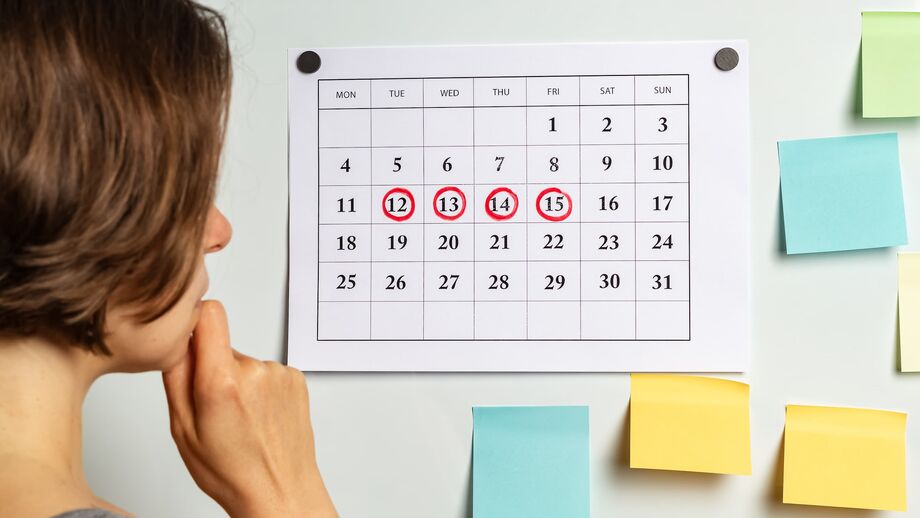How to delay your period

For many people, managing the timing of their menstrual cycle can be important, especially when a period coincides with significant life events or activities. Whether it's a wedding, holiday or an important work week, knowing how to delay your period can be helpful.
Why Delay Your Period?
There are numerous reasons why someone might want to delay their period. Some common scenarios include:
- A Big Event: Weddings, graduations, and major celebrations can be less enjoyable if they coincide with your period. Delaying your period can help you feel more comfortable and focused on the event.
- Sporting Events: Athletes often prefer to delay their periods during competitions or matches to avoid discomfort and potential performance issues.
- Holidays: Vacations are meant for relaxation and fun, which can be hindered by menstrual cramps and other period symptoms.
- Important Work or Study Weeks: Key presentations, exams, or other critical professional or academic activities can be less stressful without the added worry of managing a period.
Remember, you can choose to delay your period for any reason, no matter how mundane. Comfort and convenience are valid reasons for considering period delay.
How to Delay a Period
Delaying a period can be achieved through medication, primarily using hormonal treatments. Here are the main options available:
Norethisterone
Norethisterone is a prescription medication commonly used to delay periods. It is a synthetic form of the hormone progesterone. To delay your period, you typically start taking norethisterone three days before you expect your period to start and continue taking it three times a day for up to 17 days. Your period will usually begin two to three days after you stop taking the tablets.
Norethisterone is effective and convenient, but it should only be used occasionally. It is generally recommended that you do not use it more frequently than once every four months. Prolonged or frequent use can lead to side effects and potential health risks, so it's important to follow your doctor's guidance.
Provera
Provera is another medication that can be used to delay periods. Like norethisterone, Provera contains a synthetic form of progesterone. It works similarly by maintaining high levels of this hormone in your body to prevent the shedding of the uterine lining. The dosage and timing for Provera can vary, so it's essential to follow the specific instructions provided by your healthcare provider.
Provera can be an alternative for those who may not respond well to norethisterone or need an alternative due to medical reasons.
While delaying your period can be convenient, there are some important considerations and restrictions to keep in mind:
- Duration: You can delay your period for up to 17 days using medications like norethisterone. If you need to delay your period for longer, you should consult with your doctor for further advice and possible alternative treatments.
- Frequency: It is generally advised to use period delay medications no more often than once every four months to avoid potential health risks and side effects.
- Health Conditions: If you have certain health conditions, such as a history of blood clots, cardiovascular issues or hormone-sensitive cancers, delaying your period with hormonal medications may not be suitable. Always discuss your medical history with your healthcare provider before starting any treatment.
- Side Effects: Potential side effects of period delay medications can include nausea, headaches, breast tenderness and mood changes. If you experience any severe or persistent side effects, contact your healthcare provider.
While norethisterone and Provera are the most common methods for delaying a period, there are other alternatives that might be suitable for some individuals.
Combined Oral Contraceptive Pill
If you are already taking the combined oral contraceptive pill, you can delay your period by skipping the placebo pills and starting a new pack immediately. This method is straightforward and effective for those who are already on the pill. However, it is not advisable to do this frequently without consulting your healthcare provider.
Continuous or Extended-Cycle Birth Control
Some birth control pills are designed to be taken continuously or in an extended cycle, reducing the number of periods you have each year. These pills can be an option for those looking to manage their menstrual cycle more long-term. Speak with your healthcare provider to see if this method is suitable for you.
Delaying your period can be a practical solution for managing your menstrual cycle around important events and activities. Medications like norethisterone and Provera offer effective ways to postpone your period, but it's important to use them responsibly and under the guidance of a healthcare professional.
By understanding your options and working with your healthcare provider, you can find the best way to manage your menstrual cycle to fit your lifestyle and needs. Remember, while delaying your period can be convenient, it's crucial to use these methods safely and infrequently to avoid potential health risks. Always consult with your healthcare provider before starting any new medication or altering your menstrual cycle.

Which contraceptive pill is best?

How to get rid of flu

What causes erectile dysfunction?

What are the symptoms of flu?

How to ease period cramps

